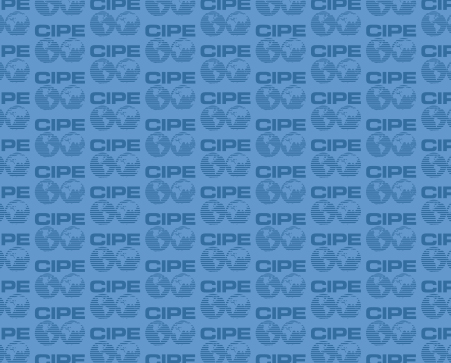
By James Stricker
Turkey has been one of the most welcoming countries for Syrian refugees since the civil war began there in 2011. In the early days of the conflict, Turkey declared an “open border policy,” allowing Syrians to enter the country largely uninhibited. Now, in the second half of 2014, the refugee crisis shows no sign of being resolved – while the strife in Syria has only intensified. More than 1.5 million Syrian refugees now live in Turkey, according to the UNHCR, including more than 135,000 who arrived within the span of five days as ISIS stepped up its assaults in Syria.
This sudden influx will almost certainly add to the challenges that many Syrian refugees are facing, but civil society organizations, like CIPE’s partner the Syrian Economic Forum (SEF), are rising to the occasion. SEF is an economic think-tank with an office in Gaziantep, Turkey, that monitors and analyzes economic developments in Syria and informs the debates concerning Syria’s future from a democratic, free-market oriented, and pluralistic perspective.
SEF regularly reports on economic developments in Syria and provides analysis to inform aid delivery, relief, and recovery. Recently, SEF issued a report that assesses the challenges of refugees, based on a survey of refugees in southern Turkey. Many of their difficulties are no doubt shared by the refugees in Syria’s other neighboring countries – difficulty finding suitable employment, adequate housing, and educational opportunities, for example. Others, however, are somewhat unique to Turkey, especially the Turkish-Arabic language barrier that complicates their daily lives.
SEF has been doing more than simply observing, analyzing, and reporting on these problems. In September, SEF conducted twelve sessions of a civic education course for 284 young Syrian refugees in Kilis, Turkey. This course helps young Syrians develop the skills they need to engage constructively in society in spite of the ongoing crisis, including conflict resolution, informed decision-making, and professional ethics. The course also encourages entrepreneurship by explaining how to start a business.
In addition to preparing Syrians for a brighter future, SEF is assisting them with the daily challenges of life. During the large refugee influx in September, SEF members, as representatives of the Syrian business community, delivered aid and provisions to the refugees as they arrived in Turkey. But ven with the essentials, many refugees face extreme difficulty finding ways to provide for themselves after they have crossed the border. With Turkey announcing that it would grant work permits to the Syrian refugees, SEF is cooperating with Turkey’s Disaster and Emergency Management Presidency (AFAD) and the Golden Crescent relief organization to create a database to match unemployed refugees with the jobs they need to support themselves and their families.
One of the most effective ways to provide these refugees with jobs may be to help them create new ones. Thanks to SEF’s efforts, the Gaziantep Free Economic Zone could provide Syrian business people and entrepreneurs with the opportunity to do just that. Through effective outreach and advocacy efforts, SEF has helped lay the groundwork for Syrian businesses to access the free zone, restart legitimate commercial enterprises, and put people to work.
Such initiatives are essential to preserve the well-being and promote self-sufficiency of those refugees struggling to provide for themselves in an unfamiliar environment. In this way, SEF is providing hope at a time when many aspects of their lives and their homeland are wrought with grief and uncertainty.
*More information can be found here on the SEF website.*
James Stricker is an intern for the Middle East & North Africa at CIPE.
Published Date: December 04, 2014
